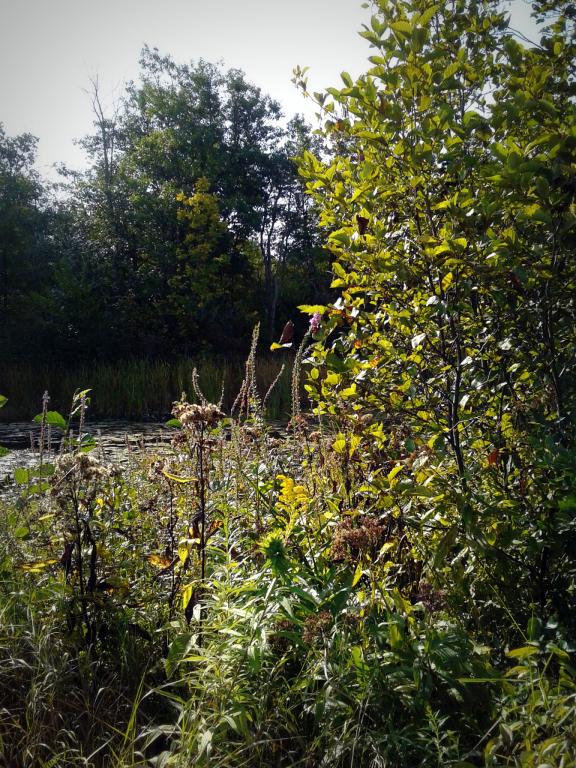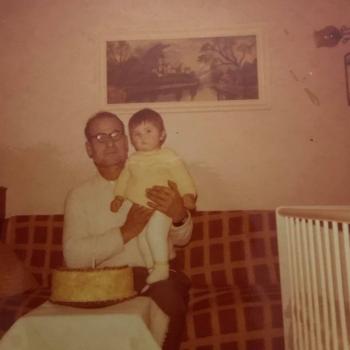Recently, at the end of a busy, stressful day, a friend’s Facebook post started me on a binge of YouTube videos of colorblind people trying out corrective glasses and seeing a full range of colors for the first time. That description doesn’t come close to capturing the engaging, joyful nature of these videos.
I’ll wait here while you watch one. Or twenty.
I have a vivid memory of putting glasses on for the first time, at 10 years old, and leaving the opticians and being blown away by the shapes of leaves on the trees. I wasn’t used to being able to see individual leaves and the shape of the whole of a tree at the same time. It felt surreal, even though what it was was *more* real.
That’s what I thought of while watching the video linked above. “The leaves are different from the trees!” says the young man seeing colors clearly for the first time.
It’s not the same as my experience–he’s seeing the leaves because he can see shades of green now, and that gives the leaves definition. But the feeling of the world opening up, of realizing there’s more than you knew, I know a little bit what that is.
It’s exhilarating, and overwhelming. In one of the videos, the guy trying on the glasses keeps taking them off or closing his eyes to shut out all the new information. Then he puts them back on and goes back to taking in his new perspective of the world.
It’s obviously overwhelming.
But my favorite thing about these videos is that, over and over again, they all come back to exclaiming over the trees and the grass. More than the balloons or flowers, paintings or house colors–the green expanse of grass and trees elicits loud excitement or quiet awe.
How often do I forget my own moment of wonder and walk past trees as though they weren’t miracles?When you walk over the grass, how often do you stop and look down to marvel at how many individual blades and different shades of green there are?

It makes me think about how much we all take for granted every day, all the things we could (in theory) manage to exist without. There’s so much gratuitous, senseless beauty around us, and most of the time we tune it out.
Every once in a while, though, we have a new-glasses moment that makes us see how much we’ve been missing and forces us to think differently about the world.
If I tell you to imagine a beach, you can picture the golden sand and turquoise waves. If I ask for a red triangle, your mind gets to drawing. And mom’s face? Of course.
You experience this differently, sure. Some of you see a photorealistic beach, others a shadowy cartoon. Some of you can make it up, others only “see” a beach they’ve visited. Some of you have to work harder to paint the canvas. Some of you can’t hang onto the canvas for long. But nearly all of you have a canvas.
I don’t. I have never visualized anything in my entire life. I can’t “see” my father’s face or a bouncing blue ball, my childhood bedroom or the run I went on ten minutes ago. I thought “counting sheep” was a metaphor. I’m 30 years old and I never knew a human could do any of this. And it is blowing my goddamned mind.
Imagine discovering that there is this thing that nearly everyone else knows about, that you knew nothing about.
Imagine the mental adjustment of making room in your mind for all of the implications of this new knowledge.
Mind-blowing is right.
But what really gets to me about all of these things–about seeing the leaves on the trees and discovering new colors and learning that other people have this amazing mental ability you’d never imagined before–is the revelatory aspect of it. It didn’t matter that I knew trees had leaves, I was still unprepared for the experience of being able to see them all at the same time. Colorblind people hear the rest of us talk about colors as we experience them for their entire lives–but purple still comes as a shock. And Blake Ross, who discovered at the age of 30 that he has aphantasia, had heard people talk about “visualizing” and “seeing” things in their mind as far back as he could remember, but it still came as a surprise for him to discover that these weren’t metaphors but actual literal descriptions of the visual imagination most human beings have.
None of us know what we don’t know–until we do.
And there’s an argument here, I think, for developing in ourselves a healthy curiosity about other people’s subjective experiences. The people around us have their own subjectivity, their own experience of the world, that we cannot know except through them.
We can’t ever fully know how someone else experiences the world. But we can be humble enough to know we don’t know, and curious enough to want to learn what we can.
And I can remember to be grateful for the shapes of the leaves on the trees.












